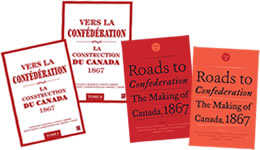 Source:
Source:
https://utorontopress.com/ca/roads-to-confederation-4
and
https://utorontopress.com/ca/roads-to-confederation-5
In recognition of Canada’s sesquicentennial, this two-volume set brings together previously published scholarship on Confederation into one collection. The editors sought to reproduce not only the "classic" studies about the people, ideas, and events associated with the passage of the British North America Act, 1867, but also scholarly works that capture the complexities of the Confederation project. This ambitious anthology challenges the notion that there exists one dominant narrative underpinning 1867, and includes research that focuses on Indigenous peoples. Seven articles written in French are translated for the first time for publication in this collection.
Volume 1
In the first volume of this anthology, Roads to Confederation introduces readers to the competing approaches to the study of Confederation and provides material that considers the nature of the 1867 project from the perspective of peoples and communities who have been traditionally excluded from the literature. It also includes the definitive scholarship on the ideational underpinnings of the making of Canada as well as several leading articles that set out different ways to understand the nature and purpose of the 1867 agreement.
Volume 2
Roads to Confederation surveys the way in which scholars from different disciplines, writing in different periods, viewed the Confederation process and the making of Canada. Recognizing that Confederation has been traditionally defined as a process affecting only British North America’s Anglophone and Francophone communities, Roads to Confederation offers a broader approach to the making of Canada, and includes scholarship written over 145 years.
Volume 2 of this collection focuses on three major themes. It presents research from the perspective of Canada’s regions, with one chapter focusing exclusively on the competing understandings of 1867 from the perspective of Quebec. Next, it includes material pertaining to the geopolitical underpinnings of 1867 that addresses the relationship between Confederation, the U.S. Civil War and American expansionism, Great Britain and war in the European theatre. Also included is leading scholarship by Stanley B. Ryerson, Adele Perry, Fernand Dumond, Ian McKay and James W. Daschuk that questions whether Confederation itself was a formative event. Together with its companion volume, this is an invaluable resource for those who wish to deepen their understanding of the historical foundations on which Canada rests.
